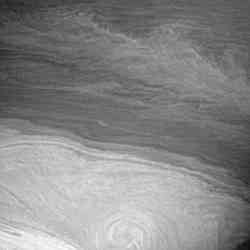
Saturn’s turbulent atmosphere. Image credit: NASA/JPL/SSI Click to enlarge
Saturn’s turbulent atmosphere is reminiscent of a Van Gogh painting in this view from Cassini. However, unlike the famous impressionist painter, Cassini records the world precisely as it appears to the spacecraft’s cameras.
The feathery band that cuts across from the upper left corner to the right side of this scene has a chevron, or arrow, shape near the right. The center of the chevron is located at the latitude (about 28 degrees South) of an eastward-flowing zonal jet in the atmosphere. Counter-flowing eastward and westward jets are the dominant dynamic features seen in the giant planet atmospheres. A chevron-shaped feature with the tip pointed east means that this is a local maximum in the eastward wind and a region of horizontal wind shear, where clouds to the north and south of the jet are being swept back by the slower currents on the sides of the jet.
The image was taken in visible light with the Cassini spacecraft narrow-angle camera on July 6, 2005, at a distance of approximately 2.5 million kilometers (1.5 million miles) from Saturn using a filter sensitive to wavelengths of infrared light centered at 727 nanometers. The image scale is 14 kilometers (9 miles) per pixel.
The Cassini-Huygens mission is a cooperative project of NASA, the European Space Agency and the Italian Space Agency. The Jet Propulsion Laboratory, a division of the California Institute of Technology in Pasadena, manages the mission for NASA’s Science Mission Directorate, Washington, D.C. The Cassini orbiter and its two onboard cameras were designed, developed and assembled at JPL. The imaging operations center is based at the Space Science Institute in Boulder, Colo.
For more information about the Cassini-Huygens mission visit http://saturn.jpl.nasa.gov . The Cassini imaging team homepage is at http://ciclops.org .
Original Source: NASA/JPL/SSI News Release
